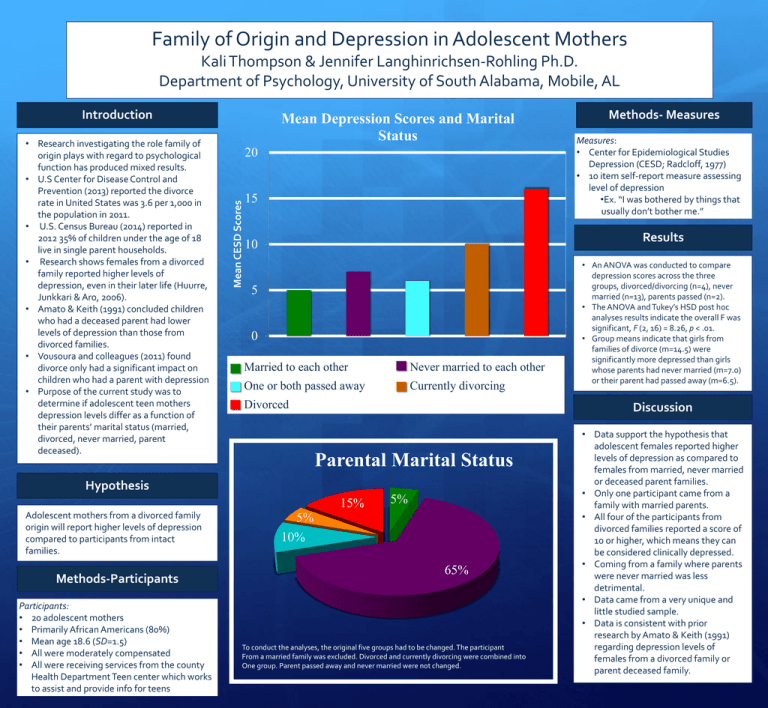Family of Origin and Depression in Adolescent Mothers
advertisement

Family of Origin and Depression in Adolescent Mothers Kali Thompson & Jennifer Langhinrichsen-Rohling Ph.D. Department of Psychology, University of South Alabama, Mobile, AL Introduction 20 Mean CESD Scores • Research investigating the role family of origin plays with regard to psychological function has produced mixed results. • U.S Center for Disease Control and Prevention (2013) reported the divorce rate in United States was 3.6 per 1,000 in the population in 2011. • U.S. Census Bureau (2014) reported in 2012 35% of children under the age of 18 live in single parent households. • Research shows females from a divorced family reported higher levels of depression, even in their later life (Huurre, Junkkari & Aro, 2006). • Amato & Keith (1991) concluded children who had a deceased parent had lower levels of depression than those from divorced families. • Vousoura and colleagues (2011) found divorce only had a significant impact on children who had a parent with depression • Purpose of the current study was to determine if adolescent teen mothers depression levels differ as a function of their parents’ marital status (married, divorced, never married, parent deceased). Mean Depression Scores and Marital Status 15 Methods-Participants Participants: • 20 adolescent mothers • Primarily African Americans (80%) • Mean age 18.6 (SD=1.5) • All were moderately compensated • All were receiving services from the county Health Department Teen center which works to assist and provide info for teens Measures: • Center for Epidemiological Studies Depression (CESD; Radcloff, 1977) • 10 item self-report measure assessing level of depression •Ex. “I was bothered by things that usually don’t bother me.” Results 10 5 0 Married to each other Never married to each other One or both passed away Currently divorcing Divorced Parental Marital Status 5% 10% • An ANOVA was conducted to compare depression scores across the three groups, divorced/divorcing (n=4), never married (n=13), parents passed (n=2). • The ANOVA and Tukey’s HSD post hoc analyses results indicate the overall F was significant, F (2, 16) = 8.26, p < .01. • Group means indicate that girls from families of divorce (m=14.5) were significantly more depressed than girls whose parents had never married (m=7.0) or their parent had passed away (m=6.5). Discussion Hypothesis Adolescent mothers from a divorced family origin will report higher levels of depression compared to participants from intact families. Methods- Measures 15% 5% 65% To conduct the analyses, the original five groups had to be changed. The participant From a married family was excluded. Divorced and currently divorcing were combined into One group. Parent passed away and never married were not changed. • Data support the hypothesis that adolescent females reported higher levels of depression as compared to females from married, never married or deceased parent families. • Only one participant came from a family with married parents. • All four of the participants from divorced families reported a score of 10 or higher, which means they can be considered clinically depressed. • Coming from a family where parents were never married was less detrimental. • Data came from a very unique and little studied sample. • Data is consistent with prior research by Amato & Keith (1991) regarding depression levels of females from a divorced family or parent deceased family.




